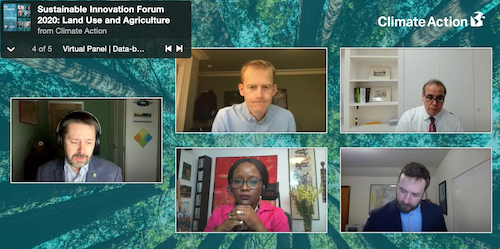“This is the last chance decade.”
— Prince Charles, the Prince of Wales

Seven Generations Ahead Executive Director Gary Cuneen participated in the recent Sustainable Innovation Forum, a high-level international summit organized by Climate Action. The forum provided dialogue and debate on the best strategies for achieving net-zero carbon emissions within the science-based recommended time frame of the Intergovernmental Panel on Climate Change. It also laid out what is needed to prepare for COP 26 in Glasgow, Scotland in November 2021.
The week-long forum covered multiple topics: finance, energy, transportation, youth, industry/technology, and land use/agriculture. Belowe are some key points gathered from the virtual summit.
Day One – Climate Policy and Finance
The first sessions of the Sustainable Innovation Forum emphasized the need for investment firms, governments, and the private sector to embrace scenario analysis and climate risk assessment to make the rationale for focusing investments on the 21st century sustainable economy.
With $380 trillion in financial system resources, most of the world’s assets are not aligned with sustainable climate goals. While this trend is showing signs of positive change and large-scale investment commitments to net zero carbon emissions, more firms need to get on board and join others in this transition.
Firms including BlackRock with $7 trillion in total assets deciding to not invest any assets in carbon polluting companies like coal; JP Morgan’s $1 billion debut in the Green Bond Market; and Zurich Insurance’s commitment to decarbonizing its portfolio completely and achieving net zero emissions with its assets distributions by 2050 – are all signs of forward progress.
What is needed according to analysts is: a) a global financial regulatory framework that creates consistency among institutions nationally and internationally; b) more investors joining the Green Bond Market and Climate Bonds Initiative; and c) a high carbon pricing policy to move the private sector into sustainable investments.
Regarding COP 26, representatives recommended ambitious commitments to the Paris Accord; a coherent global strategy for achieving net zero emissions; and a globally harmonized carbon market.
Margaret Kuhlow from the World Wildlife Federation emphasized the need for continuously updated reports on the climate crisis’ impact on biodiversity, education about the nature’s contributions to people and planet (energy; clean air; fresh water; medicines; etc.) and the impact of climate on poverty.
Day Two – Energy
The theme of “Build Back Better” was echoed by many, including the former Australian Prime Minister Kevin Rudd who recommended a scaling up of these strategies: 1) investments in renewables R&D; 2) the scaling of renewables infrastructure; 3) the decommissioning of carbon intensive infrastructure, and the elimination of coal; 4) recommitments to the Pairs Accord; and 5) that individual governments must outline a path to net zero carbon emissions.
There seemed to be clear consensus that major investments need to be made in green hydrogen, the technology for which is proven but the cost for which is currently prohibitive. Green hydrogen – the hydrolysis of water by means of electricity obtained from renewable sources – can be made from wind and solar electricity and could become the cheapest form of a much faster-than-expected transformative fuel. Oil and gas pipelines (which would become stranded assets during a renewable energy transformation) could be adapted for green hydrogen technology.
Carbon Capture and Storage (CCUS) was also posited as one of four critical energy strategies along with energy efficiency, renewables and green hydrogen – and involves steam methane reformation where the CO2 is captured and stored in a stable form elsewhere
David Kabua, President of the Marshall Islands, led by saying that “It is tempting to freeze in the face of disaster because change is difficult. Despair on the frontlines is not an option – the only solution is action that is fast, fair and bold.”

Day Three – Mobility and Youth
Some of the leading points made by presenters included:
1. With regard to air transit, incentives from government for biofuel and technology are imperative.
2. Thinking now needs to convert into action through financing green transit.
3. Mobility is no longer about vehicles (they are present), but it’s about building the infrastructure.
4. Electric Vehicle goal targets need to be synched with renewable energy goal targets.
5. Stimulus packages need to invest in green mobility.
6. Confidence and investment must return to public transit.
7. Low carbon transit is at the crux of equity.

Day Four – Industry
Today’s forum highlighted clear consensus that industry needs to change course toward net zero emissions through low-cost efficiency, digitalization of operations and renewable energy. Green hydrogen and alternative fuels are top priorities for decarbonizing cement, iron and steel. Spurring demand for low-carbon products will drive industry to change, as will carbon pricing.
Big ships take time to make big shifts. South Korea and Japan recently made net zero carbon commitments by 2050, and China made an unsolicited commitment of net zero carbon emissions by 2060. Boris Johnson of the UK just announced the UK’s 10-point plan. Leading experts propose the following:
1. A price on carbon and credit for carbon capture needs to be established.
2. Building Back Better needs to incorporate shifts toward renewables and ways to utilize stranded assets in carbon fuels, cement, steel and iron.
3. These strategies need to be pursued by sector, not by individual companies.
4. Taxes must incentivize green product development, and incentives for carbon-emitting industrial processes must be phased out.
5. Industry sectors need to jump out in front and demonstrate leadership in this transition with road maps, metrics and actions.
Government Tasks
1. Price on carbon
2. Research dollars/incentives
3. Build Back Better $10 trillion toward green tech
4. Product standards (cars; washing machines; etc.)
5. Government purchasing of green products and buyers’ clubs
Additional Climate Action Re-Cap Highlights
Systemic Change
Li Yong, Director General of UNIDO, gave a call to action, speaking on the importance of governments and businesses working together collaboratively. He said we need systemic and sustained efforts, combined with conservation to explore all possible pathways for the decarbonisation of industry.
Carbon Capture, Utilization and Storage (CCUS)
Will Gardiner, Group CEO at Drax, spoke on the importance of investing in carbon capture technology but argued that we must make these decisions now so we can plan and deliver a carbon negative future. Dr. Fatih Birol, Executive Director at the IEA, spoke about the need for new solutions to reduce emissions, to ensure we achieve net-zero.
Hydrogen – the Silver Bullet?
Eugene McKenna at Johnson Matthey highlighted the critical nature of investing in green hydrogen as a key solution that will contribute to the decarbonisation of the industrial sector, stressing that we need financial incentives to drive behavioral change.
Carbon Pricing
A number of our panelists, including Mindy Lubber at Ceres, highlighted the crucial need to put a ‘price on carbon’. Alexander Fleischander at Primetals Technologies said prices must be reduced to ensure that existing technological solutions can be put into production and scaled up to support decarbonization.

Day Five – Land Use and Agriculture
This day focused on the problems within our broken industrial agriculture system, the role of agriculture in ghg emissions, and the serious issues of desertification, poor soil health, and the destruction of wildlife and biodiversity in relation to climate change and land use policies. Panelists advocated for the use of regenerative agricultural processes to improve soil health, reduce desertification, increase healthy food production and address biodiversity losses. The solutions rest in a combination of rejecting soil practices that harm the environment and degrade soil; re-integrating low-tech soil building, regenerative agriculture strategies, and using technology to scale solutions. Specific top level strategies need to facilitate this transformation to regenerative agriculture include:
1. Sharing data
2. Breaking down silos across sectors
3. Cross company collaboration
4. Engaging the food industry in leading the path to soil health
5. Professionalizing the farming industry in some parts of the world
6. Using subsidies to promote and reward regenerative agriculture
Climate Action Re-Cap
Time is Now.
His Royal Highness The Prince of Wales shared the final call to action of the week, stressing the next 12 months are absolutely critical in raising ambition for COP26, and building our roadmaps for the decade ahead. HRH also spoke about his new Sustainable Markets Initiative which sets out why the time to act is now.
4th Agricultural Revolution
It is clear that technology and innovation will be crucial to increasing food production to sustain the growing population and aid the environment. Dr. Qu Dongyu, Director General at the FAO emphasized the importance of harnessing the potential of innovation to make this agricultural revolution a reality.
Global Food System
Margaret Kuhlowat the WWF raised the key issue of the need to change our food system, with our panelists agreeing that policy ambition is required to drive the scaling and speeding up of action. Gonzalo Munoz, COP25 Climate Action Champion, echoed this, saying we have to recognize our food system is broken, but crucial to fix as it holds key solutions to the multitude of problems we face.
Nature-Based Solutions
Zack Parisa at SilviaTerra spoke of how we need to transform how our forests are valued and managed, pointing out the importance of harmonizing data and nature for the health of our planet. Dr. Musonda Mumba at UNEP spoke of the importance of data accessibility and to ensure we learn from past mistakes so that it doesn’t lead to inequality.
Paris Agreement
For the closing session of the Forum, we were joined by California Gov. Gavin Newsom, a refreshing climate voice from the USA. Newsom spoke about the stark consequences the climate crisis has had on all Californians, and how they now regularly ‘see’ climate change. He urged the importance of the US re-joining the Paris Agreement on January 21, ending the week on a positive high.
